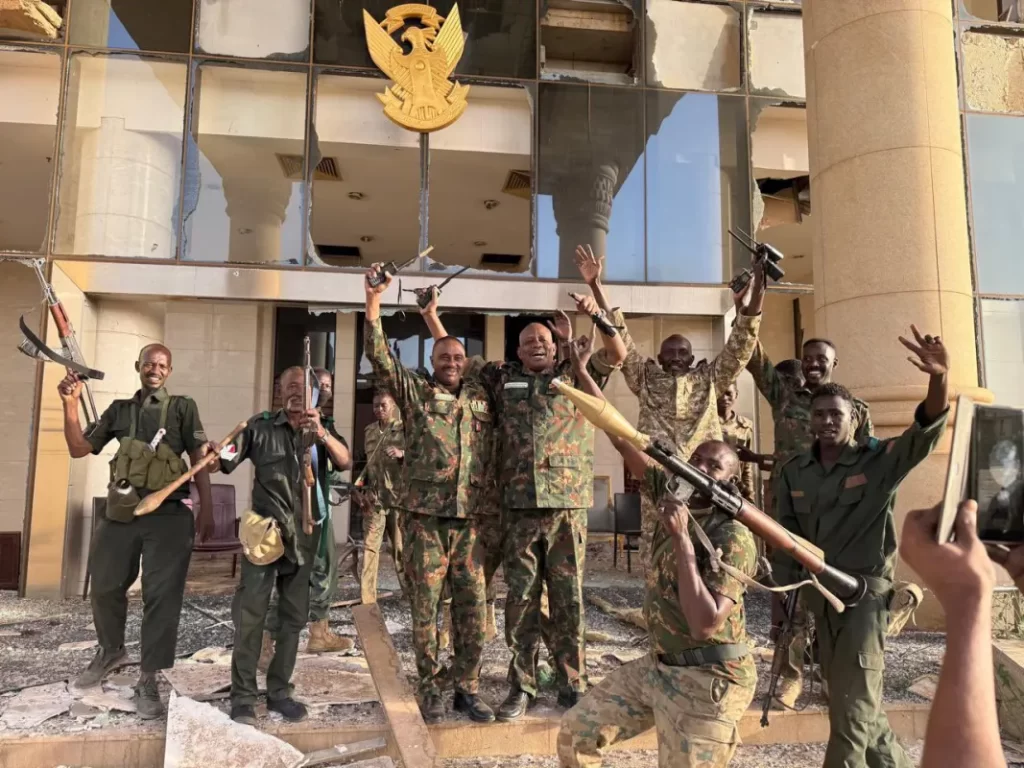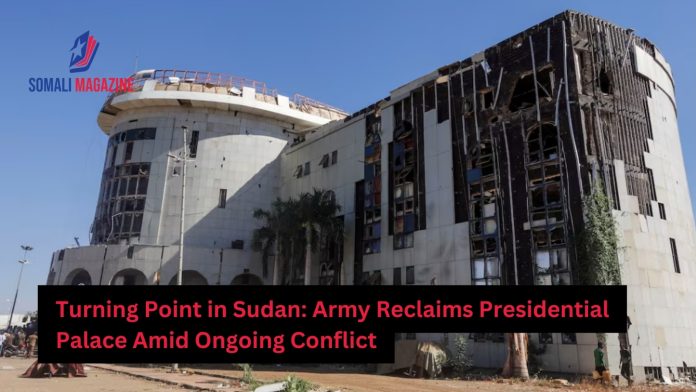Facebook Twitter Instagram Somali Magazine - People's Magazine
The Sudanese army has announced a significant victory in its ongoing conflict with the paramilitary Rapid Support Forces (RSF), declaring full control of the presidential palace in Khartoum. The recapture of this symbolic landmark on March 21, 2025, marks a pivotal moment in the two-year war that has devastated the country and displaced millions.
The presidential palace, located in downtown Khartoum, had been under RSF control since the conflict erupted in April 2023. The RSF, led by Mohamed Hamdan Dagalo, also known as Hemedti, had seized the palace during the early days of the war, forcing the Sudanese government to relocate its operations to Port Sudan on the Red Sea coast. The army’s successful operation to retake the palace is being hailed as a turning point in the battle for control of the capital.
Footage released by the Sudanese army shows jubilant soldiers celebrating inside the palace grounds, waving flags and chanting slogans of victory. The building, which bears the scars of intense fighting, symbolizes the shifting dynamics of the conflict. “Today, the flag is raised, and the palace is back in the hands of the homeland,” declared Khaled al-Aiser, Sudan’s information minister, in a statement on social media.
The RSF has yet to issue an official response to the loss of the palace, but reports indicate that its fighters have retreated to positions approximately 400 meters south of the complex. Despite this setback, the RSF continues to maintain control over significant territories in western Sudan, including the Darfur region, where it has been accused of committing atrocities against non-Arab communities.
The battle for the presidential palace underscores the broader struggle for power between Sudan’s military, led by General Abdel Fattah al-Burhan, and the RSF. The conflict, which began as a dispute over the integration of the RSF into the national armed forces, has escalated into a full-blown war with devastating humanitarian consequences. The United Nations has described the situation as the world’s largest humanitarian crisis, with over 14 million people displaced and widespread famine threatening millions more.

The recapture of the palace has been met with mixed reactions from Sudanese citizens. While some view it as a step toward restoring order in Khartoum, others remain skeptical about the long-term prospects for peace. “The liberation of the palace is the best news I’ve heard since the start of the war,” said Mohamed Ibrahim, a 55-year-old resident of Khartoum. “But we need more than symbolic victories—we need safety, stability, and an end to this nightmare.”
The international community has expressed concern over the escalating violence and its impact on civilians. Both the army and the RSF have faced allegations of war crimes, including indiscriminate attacks on civilian populations. The RSF has also been accused of genocide in Darfur, charges it denies. Calls for a ceasefire and a return to negotiations have intensified, but efforts to broker peace have so far yielded little progress.
As the conflict continues, the Sudanese army has vowed to press forward with its campaign to reclaim territory from the RSF. “We are moving along all fighting axes until victory is complete,” the army said in a statement. However, analysts warn that the battle for Khartoum is far from over, with intermittent gunfire reported in the city and the RSF showing no signs of surrender.
The recapture of the presidential palace is a significant milestone in Sudan’s ongoing conflict, but it also highlights the deep divisions and challenges that lie ahead. For a nation yearning for peace, the road to stability remains uncertain.

